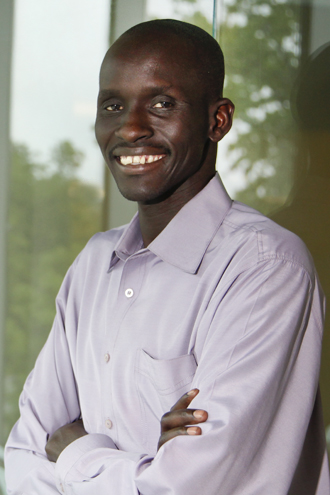A lost boy finds community on campus
Mangok Bol MS '13 hopes to use his education to build a strong South Sudan
 Photos/Mike Lovett
Photos/Mike LovettMangok Bol MS '13 is the administrator for the international and global studies program and the Mandel Center for the Humanities.
Mangok Bol’s first classroom in Kenya’s Kakuma refugee camp was in the dusty shade of a large tree. His second had mud brick walls and a grass-thatched roof. His third was a stuffy, overcrowded concrete room.
But for Bol, getting an education was all that mattered. He was a Lost Boy of Sudan, one of some 20,000 children orphaned or displaced during the Second Sudanese Civil War that lasted from 1983 to 2005.
Without parents or tribal elders, formal education became the only way to learn about the world, Bol says.
“We met successful people, like the refugee camp managers, and they were all educated. If we wanted to be successful, we knew we had to go to school,” he says.
These days Bol sits in the sparkling Mandel Center for the Humanities, surrounded by spacious, climate-controlled classrooms with floor-to-ceiling windows and wireless Internet. He is the administrator for the Mandel Center as well as the program administrator for the international and global studies program. In May, he graduated with an MS in finance from the International Business School (IBS).
Bol is more than six feet tall, with a long, lanky frame. He has a gentle handshake and an easy laugh. His boyish smile, big and gleaming, hints at an innocence never lost.
But when he speaks about his past, his accented voice is quiet, his words deliberate.
Bol was nine years old in 1987 when he fled his village in South Sudan with a few cousins. The threat of abduction by northern Sudanese forces was too great, the sound of gunfire from nearby fighting too close. The boys walked for a month across difficult terrain and unmarked roads to reach Ethiopia.
Bol lived in a refugee camp for three years with thousands of other boys before Ethiopian forces drove them out. They fled back to Sudan before eventually finding relative safety in Kenya in 1992.
School in Kakuma was hugely popular among the boys, not least because it distracted them from fear, hunger and homesickness. Bol proved an able student of English, math and history, memorizing whole textbook chapters and reciting them from memory.
In early 2000, as the United States, Canada and Australia began offering refuge to the Lost Boys, Bol’s name was among the many forwarded to U.S. resettlement agencies by Save the Children Sweden.
After more than a year’s wait, Bol made it onto a flight bound for the U.S. — one of the last — as reaction to the 9/11 attacks effectively ended the Lost Boys rescue effort. He landed on Sept. 27, 2001, in Boston — a city randomly assigned — and found a job at Logan International Airport working nighttime security. He sent most of his earnings to his brother and mother, who still lived in a Sudanese village, and put what little was left toward education.
Bol started classes at Bunker Hill Community College and soon transferred to the University of New Hampshire, where he earned a BS in business. After graduating in 2008, Bol met then-Brandeis anthropology professor Mark Auslander through the Sudanese Education Fund, where both served on the board of directors.
Auslander, who had mentored other Sudanese students at Brandeis, suggested that Bol look for a job on campus. Bol was hired as a program administrator for the interdisciplinary programs in international and global studies and cultural production in the anthropology department.
At Brandeis, Bol says, he found the community he once lost.
“There is such a strong network here,” Bol says. “It’s is a good place to grow and learn and get to know people.”
Soon, he enrolled part-time at IBS while continuing to work.
Eventually, Bol wants to use his degree to help build the newly independent South Sudan, a homeland he has not seen in 25 years. But he is not ready to go back just yet.
“I still have more to learn,” Bol says, breaking into that big, gleaming smile.
Categories: Alumni, Business, Humanities and Social Sciences, International Affairs





